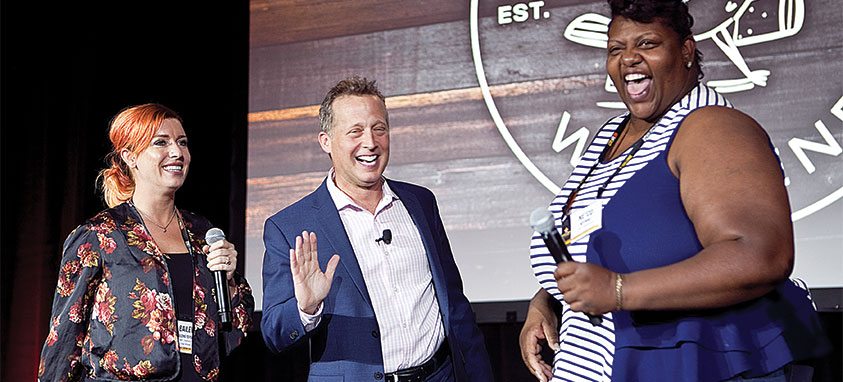Using the improvisational-comedy philosophy of “Yes, and…” can bring business results
For many years, one message that’s come from educational conferences within the meetings industry is that the word “no” should be eliminated from brainstorming and problem-solving sessions. The reason: No is a show of resistance which, if used enough times, creates hesitation among session participants to freely offer their thoughts. It also shuts down possible paths to finding an unusual solution that didn’t become apparent quickly enough in the session.
Even when the word is frowned upon in meetings, the use of no often takes place in subtle ways among the most well-intentioned business groups. For instance, it’s common for all ideas that were put forth to be voted on and ranked, which means that many simply disappear from the conversation after the first segment of the session.
To truly get away from the concept of no in meetings and allow strong creativity to emerge when it is needed, business groups could consider using the “Yes, and…” style of interaction that is the foundation of improvisational comedy. In short, this style requires that each participant use an element of what was said immediately before them to advance their own thoughts. This technique not only eliminates the idea of no from a session, but it forces participants to actively listen to those who come before them, rather than think only about what they want to say when it’s their turn.
Think about it: From Bob Hope in the 1950s to Carol Burnett in the 1970s to Drew Carey and his popular Whose Line Is It Anyway show, it’s clear that the train of thought moves in unpredictable and interesting directions when people use improvisational techniques.
Interestingly, one veteran comedy troupe that’s performed improv sketches for 20 years on the meetings circuit—the group Four Day Weekend—has also developed a training program to educate businesspeople on how to use the “Yes, and…” philosophy. Based in Fort Worth, Texas, the troupe performs locally on weekends for the general public and then travels around North America for corporate and association gatherings. Through some pre-event conversation with the host organization’s planner and executive team, the troupe can create several amusing, yet thought-provoking business-related sketches that also incorporate on-the-spot input from the audience.
When that’s done, some groups ask the leaders of Four Day Weekend to run a business session to help attendees understand and use the “Yes, and…” philosophy in their interactions. “The success of the philosophy depends on both a company’s and an individual’s willingness to proactively adopt it into their culture and practice it,” says Frank Ford, a founding member. “Practice is the key thing here, because people must overcome all those years of programming to rid themselves of the default ‘No, but…’ mentality.”
Ford stresses that this a philosophy and not a mandate for every situation. “We understand that people have to say ‘no’ at times,” he says. “The only thing we ask is that it be a well-considered no rather than a quick or reactionary no.”
He also warns that just like working out in a gym, a person can’t do “Yes, and…” once and then claim to be in shape. “They have to keep going with it over a period of time to reach their goals,” he says.
The troupe has conducted business training for more than a few companies that have experienced big changes in their industries, requiring new ways of thinking about how the organization operates.
“One major airline had us come in to help solve some trust issues they were having because of a recent merger,” Ford says. “Another client was in the media industry, which has gone from print to digital quickly and threatens any business that does not keep pace.”
He notes that a large hospital came to the troupe after being ranked dead last in both customer service and employee satisfaction. “After our keynote, where we did a few sketches and then coached attendees on how to do it, they went back home and practiced it in their meetings for months,” Ford says. “By the end of the year, their CMO [chief marketing officer] told us they had gone way up the rankings in both categories.”
Because Four Day Weekend has gotten so many offers to perform at business events, the troupe collaborated on an instructional book to spread the philosophy as widely as possible. Happy Accidents: The Transformative Power of ‘Yes, and’ at Work and in Life was released in September.
“Business books rarely use the word ‘empathy,’” says troupe co-founder David Ahearn. “But the ‘yes, and…’ philosophy helps you with that as a person. You look at life differently—you don’t see mistakes and obstacles, but rather you see work-arounds and choices. You learn about active listening and how that will make you a better communicator.”
Fellow co-founder Dave Wilk adds, “Being ‘yes, and…’ people in a ‘No, but…’ world means that others will want to work with you.”
If meeting planners can get their attendees to that level, it will benefit both their internal and customer interactions.
Rob Carey is a business journalist and principal of Meetings & Hospitality Insight, a content marketing firm for the group-business market.





